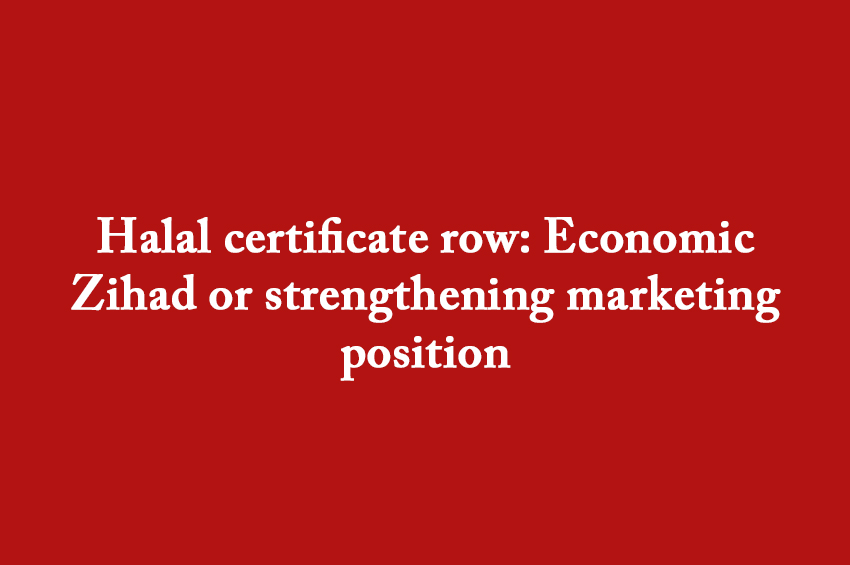Winning Bizness Desk
Mumbai. Yogi Adityanath government of UP has banned the food products related to Halal certificate. By issuing an order, the government has said that illegal business is being done in the name of Halal certification and not only this, terrorist organizations and anti-national activities are being funded with the illegal earnings from certification. The Yogi government has taken this decision on the basis of the complaint filed by Shailendra Sharma. He has alleged that some companies including Halal India Private Limited Chennai, Jamiat Ulema Hind Halal Trust Delhi, Halal Council of India Mumbai and Jamiat Ulema Maharashtra Mumbai are involved in anti-national activities and they are providing certification from dairy to spices and soap and selling them by giving them Halal certificate. Even before this, it has been alleged that an attempt is being made to impose Islamic culture in India through such certificates. Some BJP leaders have even called it 'economic jihad'. Jamiat Ulema-e-Hind has termed this step of the UP government as extremely unnecessary and has said that they will approach court to nullify this order to ban certification.
3.5 trillion dollar business
In the last few years, the worldwide Halal trade has reached 3.5 trillion dollars industry and it is being claimed that India is getting important trade partners especially from the countries of South East Asia who are strenghthening the national interests. It is achieving its market growth at an annual rate of 15-20 percent. Since one-third of the world's population is Muslim and India is also a major meat-eating market, its market is expected to grow rapidly. Indian companies like Haldiram have obtained Halal certificate. Niaz Ahmed Farooqui, CEO of a Halal trust in India, claimed that we follow the government rules, as emphasized in the notification of the Ministry of Commerce and Industry. He says, “Our Trust's Halal certificate is recognized by many governments around the world. Malaysia (ZAKIM), Indonesia, Thailand (SIACOT), Singapore (MUIS), South Korea (MFDS), Qatar (MOH), UAE Emirates (SOIAT, ESMA and IAAC), Saudi Arabia (SFDA), SASO (Saudi Arabia), all GCC countries (GAC) have recognized our certificate. We are a member of the World Halal Food Council.” They further explain that this protects consumers from using products that they do not want for many reasons. By obtaining this certificate, companies get an opportunity to increase their marketing position in at least 117 countries.
It is FSSAI's job
Notably, there is no official or government institution in India to give Halal certificates. However, many private companies and agencies are providing individual Halal certificates. The legitimacy of these companies depends on their recognition, especially among Muslim consumers, or their affiliation with Islamic countries. 'Halal India', a leading company in India that provides Halal certification, claims on its website that it gives Halal certificate to any product only after lab testing and various audits. Halal certificate is not required to sell any food item or other product in India. Here the standards of Food Safety and Standards Authority (FSSAI) have to be met.
What is Halal Certificate?
In Arabic language, Halal means ‘justified’ or' valid or proper’. In Islam, Halal certified food are processed through Islamic traditions, beliefs. Whereas, Haram means that which is prohibited in Islam, such as pork and alcohol. Neat is processed in two ways. Halal and Jhatka (jerk). In Halal meat, the meat is processed by cutting the jugular vein of the animals, whereas in Jhatka, the animal is killed by a blow to its neck. People following Hindu and Sikh religions give preference to Jhatka meat, which is banned in Islam. In such a situation, Halal certificate ensures that the product concerned meets the required standards to be considered Halal. If there is mention of Halal certificate on a product then it is not necessary that that product contains meat or has anything to do with meat. The first issue of this certificate came in 1974 and till 1993 it was limited to meat only. Later it gradually started being used in other products also. November 1 is celebrated as 'World Halal Day'.


